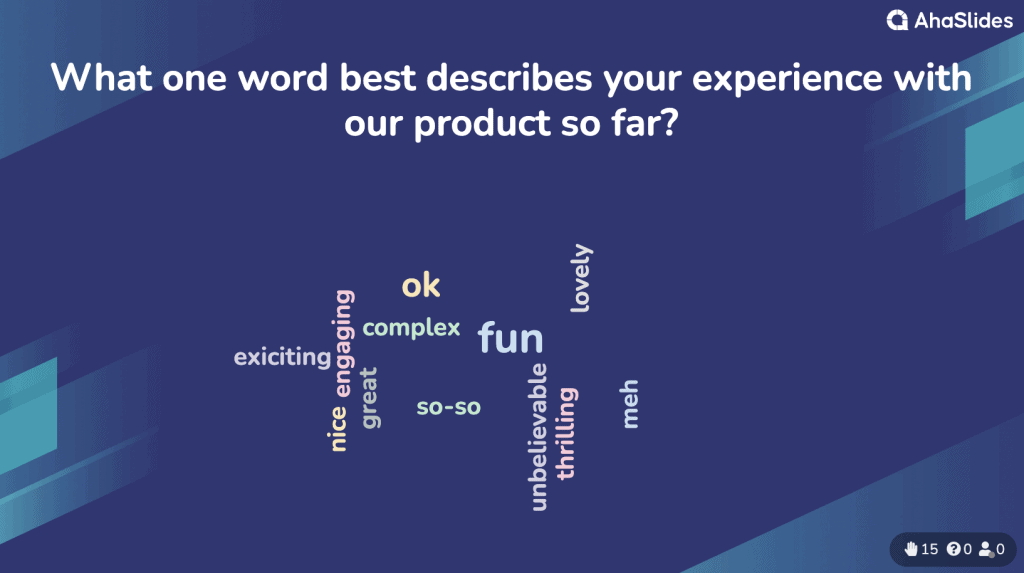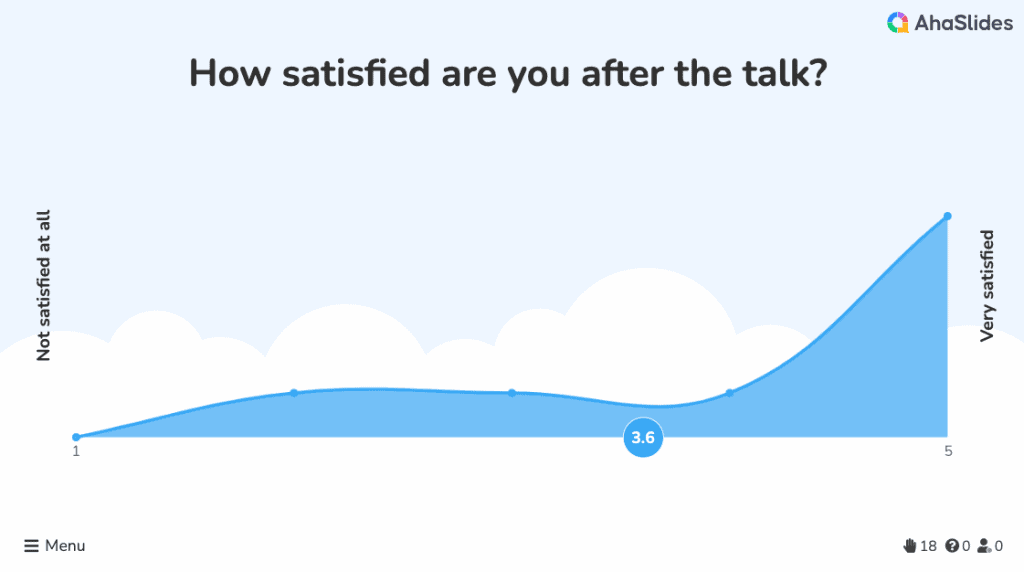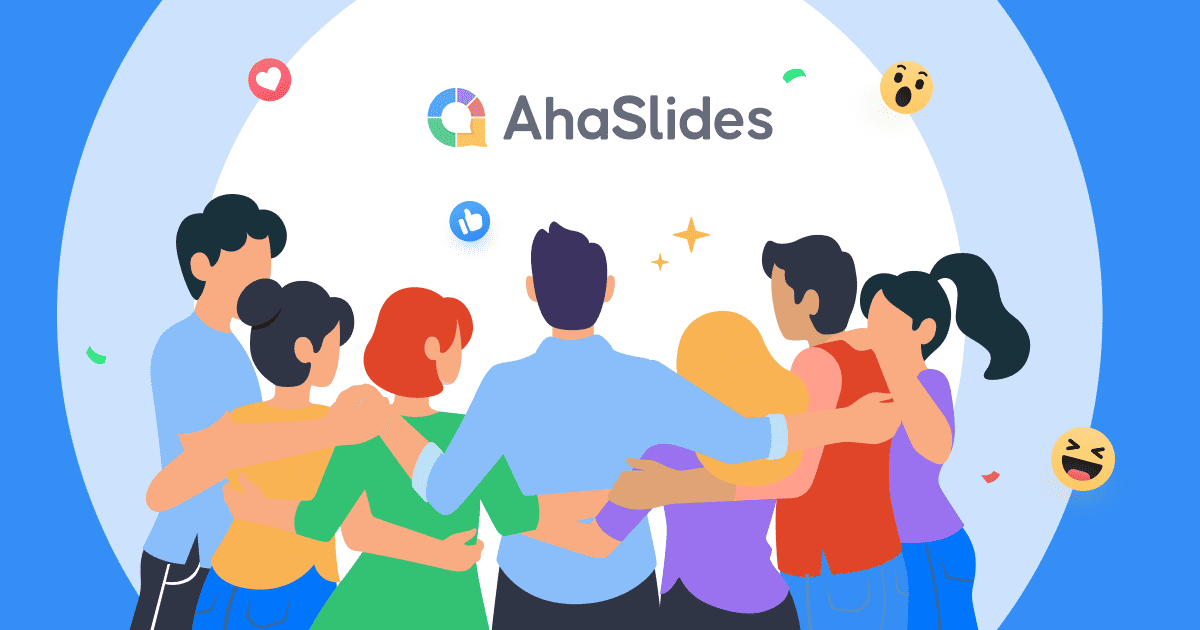💡 Want to make your event the talk of the town? Listen to feedback from your attendees.
Getting feedback, even though it can be tough to hear, is key to measuring how successful your event actually was.
A post-event survey is your chance to find out what people loved, what could've been better, and how they heard about you in the first place.
Dive in to see what post event survey questions to ask that bring real value to your event experience in the future.
Table of Content
- What are Post Event Survey Questions?
- Types of Post Event Survey Questions
- Post Event Survey Questions
- Common Mistakes to Avoid When Creating Post Event Survey Questions
- What Questions Should I Ask for Event Feedback?
- What are 5 Good Survey Questions?
- Frequently Asked Questions
Try AhaSlides' Free Survey

Tips For Better Engagement
What are Post Event Survey Questions?
Post-event surveys are a great way to see how your event really went - through the eyes of your participants. The feedback you collect from survey questions after an event can help shape future events into an even better experience!
The survey is your chance to ask participants what they thought, how they felt during the event, and what they enjoyed (or didn't enjoy). Did they have a good time? Did anything bother them? Were their expectations met? You can use virtual event survey questions or in-person ones as long as they are appropriate for your demand.
The info you gain from these post event surveys is valuable and will help you build your own perfect post-event evaluation. It shows you what's working well for your participants, and what could use improvement. You might discover things you hadn't even considered as potential issues.

Survey Questions Made Easy
Get free post-event survey templates with customisable polls. Sign up for free and take what you want from the template library!
🚀 Sign up
Types of Post Event Survey Questions
There are several types of questions you could utilise to leverage your survey. Here are some of them:
- Satisfaction questions - These aim to gauge how satisfied attendees were with various aspects of the event.
- Open-ended questions - These allow attendees to provide detailed feedback in their own words.
- Rating scale questions - These have numeric ratings for attendees to select.

• Multiple choice questions - These provide set answer options for respondents to select.
• Demographic questions - These gather information about attendees.
• Recommendation questions - These determine how likely attendees are to recommend the event.
Make sure to craft a survey with a mix of open and closed questions that generate both quantitative ratings and qualitative responses.
Numbers plus stories provide the actionable feedback you need to evolve your events into something people truly love.
Post Event Survey Questions

To really learn what people loved and what needs improvement, consider a variety of post event survey questions for attendees below👇
1 - How would you rate your overall experience at the event? (Rating scale question to gauge general satisfaction)
2 - What did you like most about the event? (Open-ended question to get qualitative feedback on strengths)
3 - What did you like least about the event? (Open-ended question to identify potential areas of improvement)
4 - Did the event meet your expectations? Why or why not? (Begins to uncover attendees' expectations and whether they were met)
5 - How would you rate the quality of the speakers/presenters? (Rating scale question focused on a specific aspect)
6 - Was the venue appropriate and comfortable? (Yes/No question to evaluate an important logistical factor)
7 - How would you rate the organisation of the event? (Rating scale question to determine the level of execution and planning)
8 - What suggestions do you have to improve future events? (Open-ended question inviting recommendations for enhancements)
9 - Would you attend another event hosted by our organisation? (Yes/No question to gauge interest in future events)
10 - Is there any other feedback you'd like to provide? (Open-ended "catch-all" question for any additional thoughts)
11 - What was the most valuable part of the event for you? (Open-ended question to identify specific strengths and aspects that attendees found most useful)
12 - How relevant was the event content to your work/interests? (Rating scale question to know how applicable the event topics were for attendees)
13 - How would you rate the quality of the presentations/workshops? (Rating scale question to evaluate a key component of the event)
14 - Was the length of the event appropriate? (Yes/No question to determine if the event timing/duration worked for attendees)
15 - Were the speakers/presenters knowledgeable and engaging? (Rating scale question focused on speaker performance)
16 - Was the event well organised? (Rating scale question to assess overall planning and execution)
17 - How was the venue in terms of layout, comfort, workspace, and amenities? (Open-ended question inviting detailed feedback on the logistical aspects of the venue)
18 - Were the food and beverage options satisfactory? (Rating scale question evaluating an important logistical element)
19 - Did the event meet your expectations for this type of gathering? (Yes/No question beginning to assess attendees' expectations)
20 - Would you recommend this event to a colleague? (Yes/No question gauging attendees' overall satisfaction)
21 - What other topics would you like to see covered at future events? (Open-ended question gathering input on content needs)
22 - What did you learn that you can apply in your work? (Open-ended question evaluating the event's impact and effectiveness)
23 - How could we improve the event's marketing and promotion? (Open-ended question inviting recommendations to boost reach)
24 - Please describe your overall experience with the event registration and check-in process. (Assesses smoothness of logistical procedures)
25 - Was there anything that could have been done to make check-in/registration more efficient? (Gathers feedback for streamlining front-end processes)
26 - Please rate the customer service and support you received before, during and after the event. (Rating scale question evaluating attendee experience)
27 - After this event, do you feel more connected to the organisation? (Yes/No question evaluating the impact on attendee relationship)
28 - How simple or complex did you find the online platform used for the event? (Knows what improvements should be made to the online experience)
29 - What aspects of the virtual event did you enjoy the most? (Sees if the virtual platform provides features that people are fond of)
30 - May we contact you for clarification or details regarding your responses? (Yes/No question to enable follow-up if needed)
Save time with ready-made survey templates
Gather responses from your audience before, during, and after the event. With the AhaSlides templates library, you can do all!
Common Mistakes to Avoid When Creating Post Event Survey Questions
Here are 6 common mistakes to avoid:
1 - Making surveys too long. Keep it to 5-10 questions maximum. Longer surveys discourage responses.
2 - Asking vague or ambiguous questions. Ask clear, specific questions that have distinct answers. Avoid "How was it?" phrases.
3 - Only include satisfaction questions. Add open-ended, recommendation and demographic questions for richer data.
4 - Not incentivising responses. Offer an incentive like a prize draw for those who complete the survey to boost response rates.
5 - Waiting too long to send the survey. Send it within a few days after the event while the memories are still fresh.
6 - Not using survey results to improve. Analyse responses for themes and actionable recommendations. Discuss with event partners and take steps to implement improvements for next time.
Other mistakes to mention:
• Only including quantitative questions (no open-ended)
• Asking "Why" questions that feel accusatory
• Asking loaded or leading questions
• Asking questions that are irrelevant to event evaluation
• Not specifying the event or initiative being surveyed
• Assuming all respondents have the same context/understanding
• Ignoring or not acting on survey feedback collected
• Not sending reminders to boost response rates
The key is to craft a balanced survey with a mix of:
• Brief, clear and specific questions
• Both open-ended and quantitative questions
• Demographic questions for segmentation
• Recommendation and satisfaction questions
• An incentive
• A "comments" section for anything missed
Then iterate and improve future events based on analysis of the feedback received!
What Questions Should I Ask for Event Feedback?
Here are post event survey examples:
Overall Experience
• How would you rate your overall experience of the event? (1-5 scale)
• What did you like most about the event?
• What suggestions do you have for improving future events?
Content
• How relevant was the event content to your needs and interests? (1-5 scale)
• What sessions/speakers did you find most valuable? Why?
• What additional topics would you like covered at future events?
Logistics
• How would you rate the event location and facilities? (1-5 scale)
• Was the event well organized?
• How would you rate the quality of the food and beverages provided? (1-5 scale)
Speakers
• How would you rate the speakers/presenters in terms of knowledge, preparation, and engagement? (1-5 scale)
• Which speakers/sessions stood out the most and why?
Networking
• How would you rate the opportunities to connect and network at the event? (1-5 scale)
• What could we do to improve networking prospects at future events?
Recommendations
• How likely are you to recommend this event to a colleague? (1-5 scale)
• Would you attend a future event hosted by our organization?
Demographics
• What is your age?
• What is your job role/title?
Open-ended
• Is there any other feedback you'd like to provide?
What are 5 Good Survey Questions?
Here are 5 good survey questions to include in a post-event feedback form:
1 - How would you rate your overall experience of the event? (1-10 scale)
This is a simple, general satisfaction question that gives you a quick overview of how attendees felt about the event as a whole.
2 - What was the most valuable part of the event for you?
This open-ended question invites attendees to share the specific aspects or parts of the event they found most useful. Their responses will identify strengths to build on.
3 - What suggestions do you have for improving future events?
Asking attendees how things could be improved gives you targeted recommendations to implement. Look for common themes in their responses.
4 - How likely are you to recommend this event to others? (1-10 scale)
Adding a recommendation rating gives you an indicator of attendees' overall satisfaction that can be quantified and compared.
5 - Is there any other feedback you'd like to provide?
An open-ended "catch-all" provides an opportunity for attendees to share any other thoughts, concerns or suggestions you may have missed with your directed questions.
Hope with these tips, you will come up with various great post event survey questions to complete your event surveys and master your following events successfully!
With AhaSlides, you can choose a ready-made survey template from the library, or create your own using a plethora of question types available in the app. 👉Grab one for FREE!
Frequently Asked Questions
What is a post event survey?
A post-event survey is a questionnaire or feedback form that is distributed to attendees after an event has taken place.
Why do we survey after events?
A post-event survey aims to assess whether your organisation's event planning efforts fulfilled the expectations of attendees, speakers, exhibitors, and sponsors.











